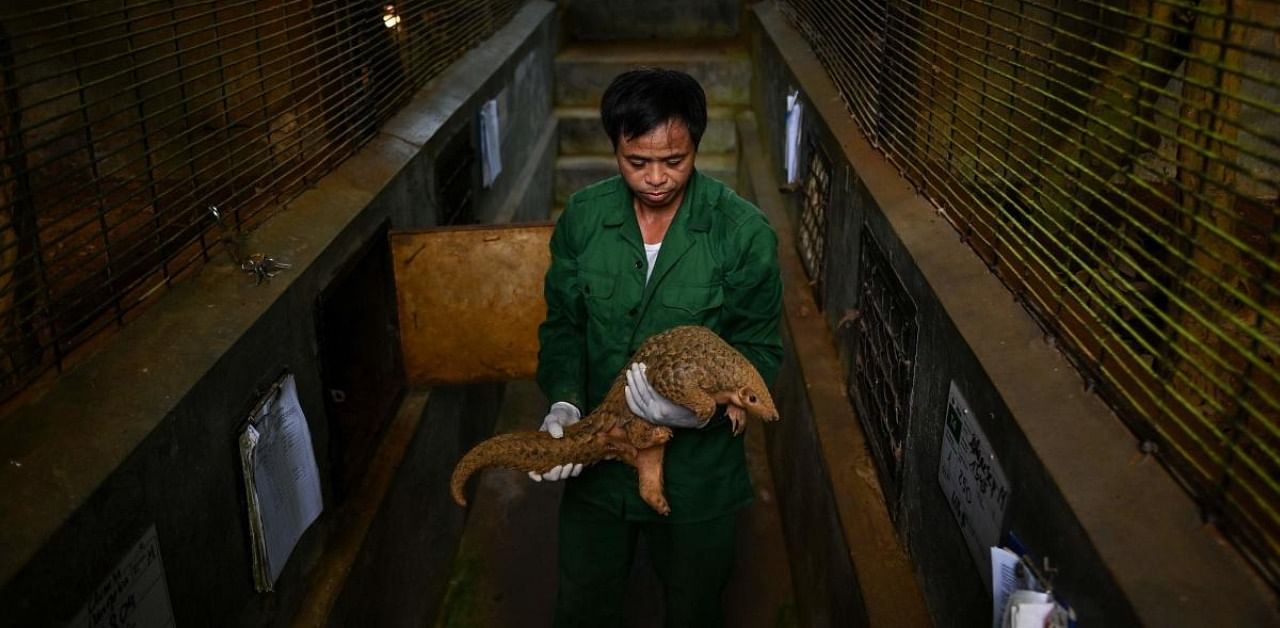
Head keeper Tran Van Truong gently takes a curled-up pangolin into his arms, comforting the shy creature rescued months earlier from traffickers in Vietnam.
Life remains precarious for the world's most trafficked mammal despite the country's renewed vow to crack down on the illegal wildlife trade that many blame for the coronavirus pandemic.
Arrests, prosecutions and wildlife seizures are up in Vietnam, but conservationists warn corruption and patchy law enforcement mean the scourge of trafficking continues.
Truong works at a centre in northern Cuc Phuong National Park run by Save Vietnam's Wildlife -- a group that has rescued around 2,000 of the so-called "scaly anteaters" in the last six years.
The 27-year-old remembers the day he discovered more than a 100 tied up in sacks, cast on the ground by police outside the truck that had carried them.
"Most of them were dead due to exhaustion," he recalls, explaining they would have had no air or water. "They get easily stressed."
Vietnam is both a consumption and a transport hub for illegal wildlife in Asia.
The pangolin's scales are falsely thought to cure anything from impotence to menstrual cramps and even cancer in traditional Chinese and Vietnamese medicine, and its flesh is also seen as a delicacy.
But earlier this year, China removed pangolin parts from its official list of traditional medicines and there are some encouraging signs in Vietnam too.
Wildlife trafficking seizures in the country have increased 44 per cent over a two-year period, according to NGO Education for Nature Vietnam (ENV).
In the first six months of 2020, 97 per cent resulted in arrest.
Prosecutions are also significantly up.
The shift came on the back of a revised law in 2018 that pushed up punishments, both fines and prison terms, and closed loopholes -- an effective way to deter wildlife crime, the NGO says.
But enforcement is still a huge issue.
In July, as fears of the pandemic spread, the government urged ministries, courts and prosecutors to apply the law properly.
Giving over-stretched agencies more to do without the resources to match, however, is simply "inviting failure", warns Dan Challender of Oxford University, a specialist in pangolins and wildlife trade policy.
Many are committed to eliminating the trade, says Ha Bui from ENV, but traffickers are still being let off too easily.
"It's often due to corruption that people get a lighter sentence."
For Save Vietnam's Wildlife director Nguyen Van Thai, the laws do not go far enough and should also target consumers.
If police find pangolin meat at a restaurant, "it is only the restaurateurs that will have problems, not the people eating it," he says.
Back in Cuc Phuong National Park, Truong spends hours making life comfortable for pangolins that have survived distressing encounters with traffickers.
He keeps them away from loud noise and only feeds them their favourite food -- ants' eggs and termites.
"I love all wild animals," he says, adding he might look to diversify soon.
"There are others that are on the verge of extinction so I want to help save them next."